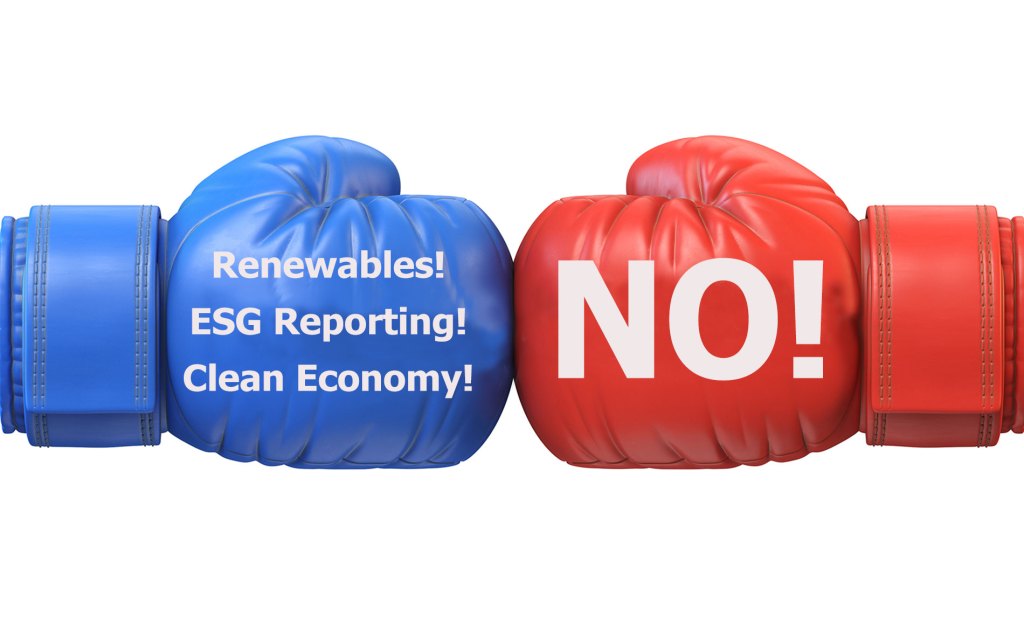The politics of climate change and ESG are about to get ugly
During 2022, climate and mandatory ESG reporting will be on the ballot in scores of states and localities. Read More

GreenBiz Group
Twenty twenty-two will bring another election in the United States, a blessing bestowed upon Americans every 24 months. There will be the usual market basket of issues to debate — or, at least, to knock down the opposition with whatever it takes. We’ll hear about the economy, jobs, immigration, wages, vaccines, health care, housing, guns, abortions and — wait for it — climate change and ESG.
Yes, climate and mandatory ESG reporting will be on the ballot in scores of states and localities — not necessarily directly but as part of an orchestrated effort by the conservative right to thwart, and possibly reverse, efforts to transition to a low-carbon and just economy.
It defies logic: Creating jobs, fostering innovation and leveraging market forces are all rock-ribbed Republican values. And yes, decarbonizing the economy will require some regulatory oversight as well as financial subsidies and incentives, although only a fraction of the subsidies that have existed for fossil-fuel energy for decades. (Centuries, actually, according to this study.) Along the way, there will be some stranded workers who must be retrained or otherwise taken care of, although there likely will be many times more new jobs created, including high-paying union jobs, in every U.S. state.
No one said that transforming our economy would be simple or painless.
So, what’s the problem? Far as I can see, it’s a continuation of the conservative messaging machine that long ago turned environmentalism, Al Gore, climate change, renewable energy and pretty much the color “green” into bogeymen that can rally viewers, voters and donors. Add to that the organizational ecosystem that helps conservatives mold state laws to suit their interests, the manufactured culture wars aimed at dividing right from left, and the Republican domination of the judiciary and state legislatures.
Moreover, addressing climate change has become a key focus of the Biden administration — not to mention that of nearly every other democratic nation. So, naturally, Republicans are against it, even if their opposition runs counter to their constituents’ interests.
Welcome to “the next wedge issue,” as Politico described it.
Ironically, this comes at a time when a small corps of Republicans has recognized, finally, that the climate crisis is real and potentially devastating, and that denying or ignoring it may no longer be politically tenable. They support renewable energy and electric vehicles, although they are a voice in the wilderness.
“Just as the GOP’s clean-energy champions find their footing, the party’s culture warriors, led by climate change skeptic Donald Trump, are prepping for midterm primary battles that could trip up the effort right out of the gate,” Politico’s Lorraine Woellert, Ben Lefebvre and Ryan Heath wrote last month.
Last week, The New Republic revealed another part of the strategy, courtesy of the American Legislative Exchange Council (ALEC), an organization of conservative state legislators that drafts model legislation its members can introduce in their states.
The newest bogeyman: something called “Critical Energy Theory,” a term that is, at best, head-scratching as to its meaning but clearly intended to leverage the manufactured outrage over “Critical Race Theory,” which became a 24/7 talking point among some conservative media mouthpieces.
At ALEC’s 2021 States & Nation Policy Summit earlier this month, the group
voted to back “two pieces of model legislation that portray climate policy — even climate policy that doesn’t exist yet — as unfairly discriminating against fossil fuel companies,” according to New Republic staff writer Kate Aronoff. One of those, she wrote, is the “Energy Discrimination Elimination Act,” which directs states to compile a list of entities that are supposedly boycotting fossil fuel companies, explicitly citing banks that are “increasingly denying financing to creditworthy fossil energy companies solely for the purpose of decarbonizing their lending portfolios and marketing their environmental credentials”; institutional investors that are “divesting from fossil energy companies and pressuring corporations to commit to the goal of the Paris Agreement to reduce greenhouse gas emissions to zero by 2050”; and large investments that are “colluding to force energy companies to cannibalize their existing businesses.”
So, forward-thinking banks, energy companies and institutional investors may find themselves in the crosshairs of the radical right. And they could find themselves hampered in their ability to direct capital away from polluting technologies and companies, and toward those working to create a decarbonized, net-zero economy.
And what about “regular” companies — maybe yours? — that pledge to phase out their use of fossil fuels? Will they find themselves penalized or unwelcome for “unfairly discriminating against fossil fuel companies”? And will all this unleash a hornet’s nest of litigation on both sides that could drag on for years and have a dampening effect on the march to progress?
So much for free-market capitalism.
As I said, it’s not just climate. Last fall, in anticipation of new rules on mandatory ESG reporting from the U.S. Securities and Exchange Commission, Republican lawmakers ramped up attacks on corporations that publicly embrace such issues.
According to Roll Call,
The GOP opposition to more corporate ESG reporting doesn’t have much chance of success in a Democratic Congress, but some experts say their efforts underscore the high stakes in the battle for regulations and offer a preview of Republicans’ long game ahead of next year’s midterm elections.
Off the sidelines
All of this is destined to ramp up pressure on companies and their lobbying arms to get off the sidelines and into the game.
For decades, it was safe for companies’ government affairs teams to remain silent on sustainability topics. On the list of priority issues for their lobbyists, these simply didn’t make the cut. And there was little or no reputational penalty for inaction. At most, they might be criticized over the misalignment between their corporate sustainability goals and their membership in trade associations — the U.S. Chamber of Commerce, the National Association of Manufacturers — that were variously climate deniers or simply voted to keep the status quo.
That’s changing, albeit slowly. Nonprofits such as Ceres or ClimateVoice (where I’m an unpaid adviser) are working to make it less safe for companies to keep quiet on these issues. But it’s a slog: Persuading employees, customers, investors and others to press companies to speak out on sustainability issues requires resources and political capital that companies don’t seem willing to spend.
So, what will it take for the private sector to take a stand on these issues, ensuring that all the benefits of a clean economy — jobs, decarbonization, innovation, new business opportunities — are realized and that those who want to derail those efforts are themselves sidelined? What role will employees (and future employees) or customers play in pressing companies to act? Will institutional investors pick up the slack? Could “Act on Climate” shareholder resolutions become a new trend during next year’s proxy season?
This is destined to be of the more interesting, and potentially disturbing, stories of 2022. Brace yourself.
I invite you to follow me on Twitter, subscribe to my Monday morning newsletter, GreenBuzz, from which this was reprinted, and listen to GreenBiz 350, my weekly podcast, co-hosted with Heather Clancy.













